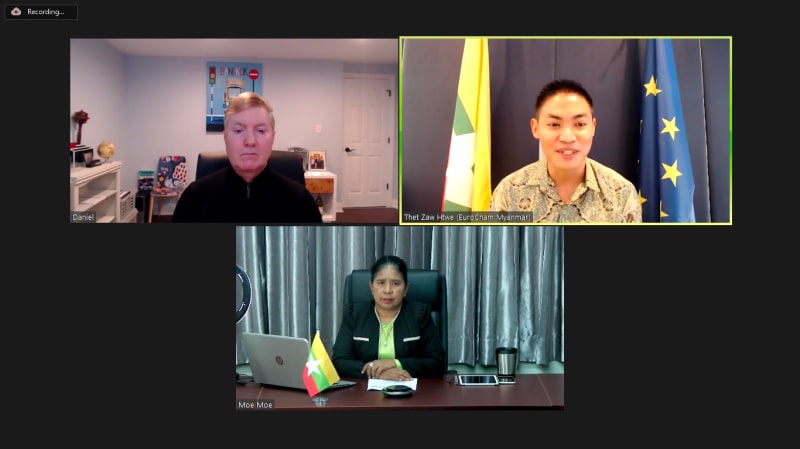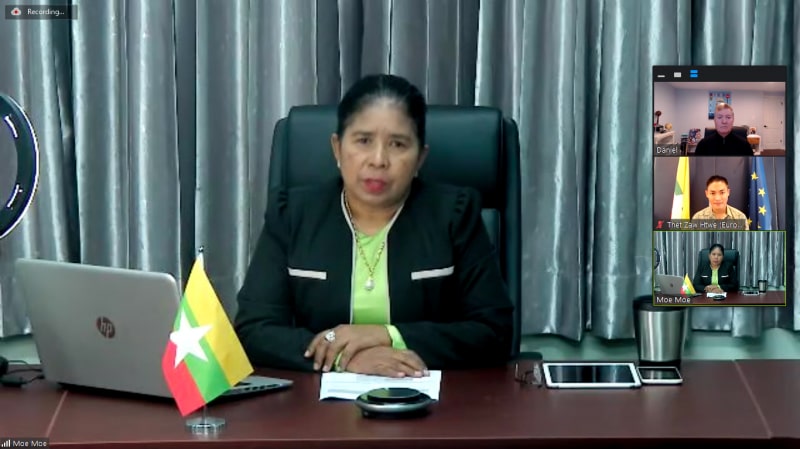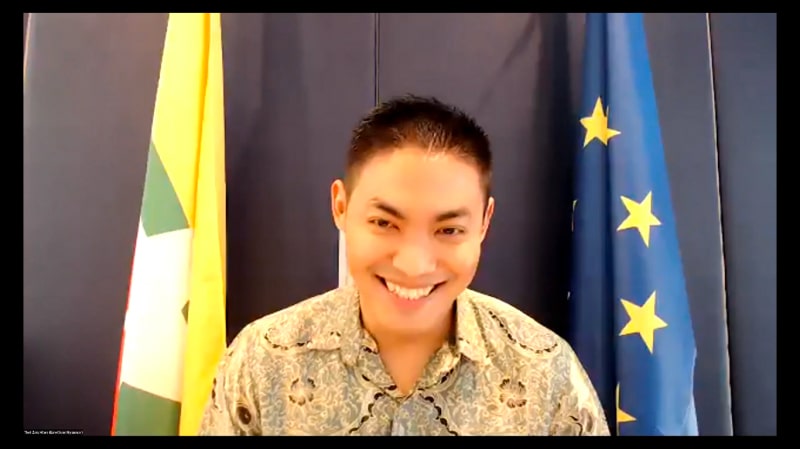Recap of Intellectual Propriety Rights and Trademark Law in Myanmar: “What business needs to know and understand?” – Online Discussion
On the 22nd of January 2021, EuroCham Myanmar hosted a webinar, together with the South-East Asia IP SME Helpdesk, on Intellectual Property Rights and Trademark Law in Myanmar. This is a very relevant topic for businesses engaged in the country, as Myanmar is currently transitioning from its old first-to-use trademark registration system to a new first-to-file one, streamlining a more efficient and effective trademark registration system in Myanmar. The aim of this webinar was to particularly focus on what businesses should know about these changes and developments and on how they can best adapt and conform to the new laws and regulations.
EuroCham is extraordinarily grateful to Dr Moe Moe Thwe, Deputy Director General (DDG) of the Department of Intellectual Property, and Mr. Daniel Greif, external expert for the South-East Asia IP SME Helpdesk and lawyer with over thirty years of experience in international trademark law, for taking the time to share their expertise with the business community. U Thet Zaw Htwe, Head of Policy and Strategy of EuroCham Myanmar opened the webinar discussion by saying as the voice of European businesses in Myanmar, EuroCham stands ready to support the Intellectual Property Department in their endeavour to successfully implement the new trademark registration system.
Myanmar already passed four substantial Intellectual Property (IP) laws between January and May 2019, namely a new Patent, Copyright, Trademark, as well as Industrial Design Law, which are based on the World Intellectual Property Organisation’s (WIPO) Model Law. However, implementing and subsequently enforcing said legislation is an undertaking requiring an enormous amount of preparation, as was outlined by DDG Dr Moe Moe Thwe. This includes the reorganisation of and redistribution of responsibilities among different ministries and governmental departments as well as the creation of the Department of Intellectual Property, which is now leading all trademark registrations. What is possibly particularly relevant for businesses to be aware of is that before the grand opening of the new registration system, there is an ongoing period of soft opening, with the aim of enabling a smooth transition from one system to another. Businesses can prepare themselves more effectively for this grand opening by observing a few suggested steps, which are explained further below.
As already mentioned above, the new system is based on the first-to-file principle, which is one of the most fundamental changes. Furthermore, the new Trademark Law also features broad definition of Trademark, which Mr Greif described as a welcome addition. After filing a trademark application under the new law, the registrar will examine the application based on formalities as well as absolute grounds. The applicant will then receive a notification confirming conformity or non-conformity to the regulations. If the application is approved, it is passed to publication and if no opposition is filed, a trademark registration is issued. This means that an official registration and publication of trademarks is set to replace the publication of trademarks in newspapers.
Trademarks will be registered for 10 years from the filing date, with a renewal for ten years at a time being possible. When registered under the new law, owners of trademarks will also have the exclusive right to stop third party use as well as litigate against infringers and transfer, assign or license rights. However, as emphasised by Mr Greif, trademarks can also be invalidated – on absolute as well as relative grounds- and can be cancelled for non-use – albeit not in commerce – if not used for three consecutive years. Applications for invalidations and cancellations of trademarks can be filed by any interested party with the Department of Intellectual Property or the Intellectual Property Committee.
Some suggested steps for businesses to prepare for the transition from the old system to the new and for the refiling of trademarks are to undertake analyses of current trademarks, including cost-benefit analyses, in order to be able to determine which trademarks are important enough to be refiled. If possible, it might be beneficial to already file in the soft opening phase, as this phase not only provides the opportunity to re-register marks but if filed during this period, the first day of grand opening will then be registered as the date of filing, thereby assigning the application the earliest priority date possible.
As the process of transitioning from the old Trademark Law to the new is still ongoing, EuroCham members as well as others interested might want to have a look at the website of the South-East Asia IP SME Helpdesk, our partner for this event and the website of the Department of Intellectual Property. In addition to services such as workshops and webinars, they provide country factsheets, guides, and newsletters as useful resources for European small and medium sized enterprises active in South-East Asian countries. The Department of Intellectual Property also regularly shares developments on their website and Facebook page. Via their own YouTube channel, they also offer in-depth video explanations of the new trademark registration system (only available in the Myanmar language).





No Comments
Sorry, the comment form is closed at this time.